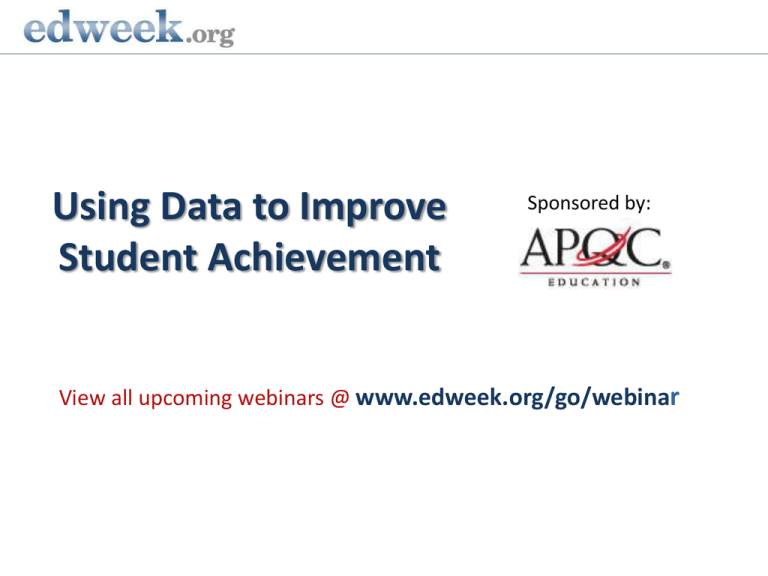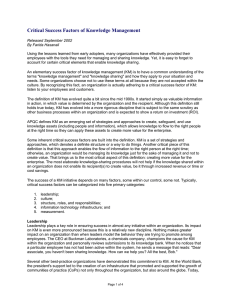
Using Data to Improve
Student Achievement
Sponsored by:
View all upcoming webinars @ www.edweek.org/go/webinar
Gerald Herbert/AP
Our Education Week Guest
Katie Ash
Staff writer for Education Week and Education
Week Digital Directions.
Blogger at Digital Education
www.edweek.org/go/diged
On Twitter at www.twitter.com/digidirections
Our Guests:
Martha Greenway
Director, EdTech Leaders Online, Education
Development Center
Baron Rodriguez
Director of state data systems, Data Quality
Campaign
Follow today’s conversation on Twitter.
Go to Twitter, and search using keyword
#edweeklive. Use the hashtag to converse,
share resources, tips, and URLs with our live
audience.
Baron Rodriguez, Director
State Data Systems
December 2009
Every governor and chief state school officer
has committed to building a P–20/workforce
longitudinal data system with all 10 Essential
Elements by 2011.
Policy issues previously considered
“untouchable” are now being discussed. States
are addressing obstacles, including legal
barriers, to linking and/or using teacher and
student information.
1. Unique statewide student identifier
2. Student-level enrollment, demographic and program
participation information
3. Ability to match individual students’ test records from year to
year to measure growth
4. Information on untested students
5. Teacher identifier system with ability to match teachers to
students
6. Student-level transcript information, including information on
courses completed and grades earned
7. Student-level college readiness test scores
8. Student-level graduation and dropout data
9. Ability to match student records between the P-12 and
postsecondary systems
10. State data audit system assessing data quality, validity, and
reliability
8/24/2009
9
8/24/2009
10
8/24/2009
11
Coming in
January 2010:
Survey results for the
DQC 10 State Actions
8/24/2009
12
The Data Quality Campaign partnered with APQC Education to
conduct a benchmarking study on:
Data Collection & Reporting
Data Management and Analysis
Best practices in data management/maintenance
Best practices in data analysis
Culture
Collecting and aggregating data from (often disparate) data sources
Ensuring data reliability and validity
State-district data transfer
Integrating data into daily activities
Organizational structures, policies, practices that promote data use
Utilization
Promoting use of data at all levels
Professional Development/Training
Aldine
ISD, TX*
Anoka-Hennepin School District, MN*
Baltimore County Public Schools, MD
Bedford County Department of Education, TN*
Bellevue School District 405, WA
Blue Valley School District, KS*
Carrollton-Farmers Branch ISD, TX
Charles County Public Schools, MD
Chicago Public Schools, IL*
Clark County School District, NV*
Community Consolidated School District 93,
IL*
Community Unit School District #300, IL*
Corpus Christi ISD, TX*
Coventry Public Schools, RI*
Cypress Fairbanks ISD, TX*
Dallas ISD, TX*
Dysart Unified District, AZ*
East Baton Rouge Parish School Board, LA*
Elk Grove Unified School District, CA*
Enlarged City School District of Middletown,
NY*
Fairfax County Public Schools, VA*
12/1/2009
Fort Wayne Community Schools, IN*
Fort Worth ISD, TX*
Fresno Unified School District, CA
Fulton County Schools, GA*
Gaston County Schools, NC*
Guilford County Schools, NC*
Gwinnett County Public Schools, GA*
Hampton City Public Schools, VA*
Harford County Public Schools, MD*
Houston ISD, TX*
Humble ISD, TX
Iredell-Statesville Schools, NC*
Jenks Public Schools, OK*
KIPP: Houston, TX
Klein ISD, TX*
Lake Washington School District No. 414,
WA
Los Angeles Unified School District, CA*
Loudoun County Public Schools, VA*
Mesa Unified School District, AZ*
Metropolitan Nashville Public Schools, TN*
Miami-Dade County Public Schools, FL*
Montgomery County Public Schools, MD*
New York City Public Schools, NY*
14
North Penn School District, PA*
Oakland USD, CA*
Palo Alto Unified School District, CA*
Paradise Valley Unified District, AZ*
Pasco County School District, FL*
Pawtucket School Department, RI
Pinellas County Public Schools, FL*
Poudre School District, CO*
Prince William County Public Schools,
VA*
Richland County School District 2, SC
Rockwood School District, MO*
Sacramento City Unified School District,
CA*
San Diego Unified School District, CA
San Francisco Unified School District,
CA
St. Charles CUSD 303, IL*
St. Charles Parish Public Schools, LA*
Tulsa Public Schools, OK*
Virginia Beach City Public Schools, VA*
Wake County Public School System, NC*
Washoe County School District, NV*
Waukesha School District, WI*
Western Heights Public Schools, OK*
Westfield Washington Schools, IN*
Aldine ISD, TX
Fulton County Public Schools, GA
Gwinnett County Public Schools, GA
Western Heights, OK
Iredell-Statesville Schools, NC
Montgomery County Public Schools, MD
Palatine (CC School District 15), IL
Clark County Public Schools, NV
12/1/2009
15
•
Utilize Standards-Based Measures to Inform
Instructional Decisions
•
Offer professional development opportunities to
support a culture of data use
•
Establish and leverage leadership support of a
data-driven culture
•
Adopt continuous improvement model that tracks
key indicators
•
Design and implement a data governance strategy
to ensure data quality
12/1/2009
16
•
•
Cultural: Misalignment between data
requested by the state and data used by
the district to improve student
achievement
Technical: State to District Data Transfer
Barriers
12/1/2009
17
Advocate for state/district collaboration on data systems –
HUGE opportunity around ARRA and I-3 (Investing in
Innovation) funds.
Working on providing a clearinghouse on district data use
through our website.
Charlotte/Mecklenburg SD
Houston, TX ISD
Provide model on state/district relationship to maximize
resource capacity for scalability and sustainability
Advocate for common data standards to maximize
interoperability between district/state/federal systems.
Baron Rodriguez
(202) 295-7868
Baron@DataQualityCampaign.org
www.DataQualityCampaign.org
11/2009
20
American Productivity & Quality
Center (APQC)
Jack Grayson
Chairman
APQC
APQC:
American Productivity & Quality Center
Founded 1977 - $10 million from 100 Orgs.
Staff: 80
Budget $12 million
Business, Healthcare, Government, Education
Baldrige, KM, Benchmarking, CoPs, Metrics
25-Member Education Advisory Council
In 54 countries, 6 continents
Mission:
Improve productivity and quality
©2009 APQC. ALL RIGHTS RESERVED.
22
www.apqc.org
Benchmarking
Trained over 10,000 in benchmarking and
Knowledge Management (KM) in 36 countries
4,500 Benchmarking & KM Research Studies
Benchmarking in K-12 Education:
English Language Learners
Recruiting, Selecting, Hiring Employees
Managing Information Technology
Professional Learning Communities
Math & Science Student Achievement
Response to Intervention (underway)
Data Driven Decision Making
©2009 APQC. ALL RIGHTS RESERVED.
23
Fulton County Schools
Data-Driven Journey
Martha Greenway
Deputy Superintendent
December 1, 2009
Greenwaym@fulton.k12.ga.us
Adopted the Balanced Scorecard in
2000, but then…
Complexity Increases
71 Schools…………99 schools, 6 charters
67,000 Students……90,000 students
32% poverty……….40% poverty
8500 Staff…………12,000 staff
“Wish list”
budget surplus……..$62.5 million cut
(so far…)
$1.134 billion budget
In spite of all this….
86% 1st time passing HS exit exam .. from 77%
83.7% graduation rate .. from 72.9%
1061* SAT reading and math .. from 1027
(*75% SAT participation vs. 1016
in nation with 46% participation)
37% enrollment in
AP courses vs. 11%
(while maintaining 75% passing rate)
Value Statements
Each Fulton County school will educate
every student to his/her fullest potential.
Fulton County will engage parents as
key partners in the educational process.
Each Fulton County school will be the
preferred school for its students and parents.
Each Fulton County school will provide greater
value for each child’s educational experience
when compared to top-performing public and
private schools in the nation.
Fulton County schools will prepare each student
to excel in a rapidly changing global society.
Continuous Improvement
Refined Student Achievement Measures
Value-added measures
Black achievement gap
Value-Added Model with
Benchmark Comparison
Continuous Improvement
Teacher – level analytic tools
Continuous Improvement
Align Instructional Strategies and
Professional Development
VALUE-ADDED
PROFESSIONAL LEARNING MODULES
STANDARDS
AUTHENTIC
ASSESSMENT
DATA
UTILIZATION
DIFFERENTIATED
INSTRUCTION
STUDENTFOCUSED
CULTURE &
CLIMATE
Continuous Improvement
Define and Measure Enterprise
Processes
Enterprise Process Model
Core Processes
Develop Curriculum
Deliver Instruction
Assess Student Learning
Supporting/Enabling
Processes
Federal, state,
and local rules
and regulations
Support Student Learning
Manage Financial Resources
Engage Stakeholders
Effectively Integrate Technology
Ensure a Safe Environment
Manage Human Resources
Ensure Operational Efficiency
Board of
Education policies
Research and
Best Practices
Guiding
Processes
Accrediting
Agencies
Fulton County School System Strategy Map
Students
Master
Curriculum
Students are
Nationally
Competitive
Ensure Student Achievement
Process
Improvement
Themes
Develop,
Deliver and
Assess
Teaching and
Learning
Support
Student
Learning
Ensure a
Safe
Environment
Effectively
Integrate
Technology
Engage Stakeholders
Manage Human Resources
Manage Financial Resources
Ensure
Operational
Efficiency
Continuous Improvement
Aligned school and central
department measures
Process improvement training
Cross-functional action teams
for process improvement
(XFATs)
Enterprise Business System
Learning Management System
Enhanced Student Information System
Enterprise Information Model
Business Intelligence tools
Web Portal
Future enhancements
Implement more sophisticated business intelligence tools
Expand analytic skills of staff
Deepen leadership understanding
Align individual performance
management
Expand best practice sharing
Establish centralized initiative
and project management
Expand risk identification
Remain strategy focused through challenging financial times
Question & Answer Session
Questions and Answers
Question #1
"Not everything that can be measured matters, and
not everything that matters can be measured."
How do we insure that we're engaging in
authentic data-informed decision making and
not merely creating more meaningless metrics
around student achievement?
Question #2
Some educators are apprehensive about the
use of data, either because they do not have
experience with it or because they anticipate
its being used as “gotcha.” What strategies are
most successful in encouraging these
educators to see the benefits of using data to
inform instructional improvement?
Question #3
Teachers need time to review, discuss and
analyze data. How do you create this time for
teachers without negatively impacting
instructional time?
Question #4
What guidance can you give urban school
administrators on what data we need to
collect that will better inform us holistically on
a student's learning needs in order to help
guide us in developing instruction to get more
sustainable results for our children?
Question #5
How do we get students to buy
into the process?
Question #6
What is the time required and what
training is required for classroom
teachers to use data to improve
instruction?
Question #7
How do you see struggling school
districts paying for data collection?
Question #8
Are there examples at the state or district
level of systems that are successfully
supporting the use of the data from state
longitudinal systems at the school,
classroom, and student levels?
Question #9
What was the organizational impact of moving
toward this progress model of real-time
accountability? How did you meet the end-user
needs at all the various levels of the
organization? How did you gain organizational
agreement on a central vision around this work
and keep the message clear and consistent?
An on-demand archive of this
webinar is going to be
available at
www.edweek.org/go/webinar
in less than 24hrs.
Please visit often, and send this link to your friends.
Thanks for taking part today. We really appreciate it.
The Editors @ edweek.org
Best Practices in Data-Driven
Decision Making
Diane Kline
APQC Education
71 Participating Districts
©2009 APQC. ALL RIGHTS RESERVED.
55
Best Practice Partners
Aldine ISD, TX
Clark County Public Schools, NV
Fulton County Public Schools, GA
Gwinnett County Public Schools, GA
Iredell-Statesville Schools, NC
Montgomery County Public Schools, MD
Palatine (CC School District 15), IL
Western Heights, OK
©2009 APQC. ALL RIGHTS RESERVED.
56
A sampling of study recommendations
Create and allocate resources for a continuous improvement
system that requires the use of longitudinal data to create and
track key performance indicators related to data use
Allocate time through department meetings, professional
learning communities, and other communication vehicles for
teachers to view, discuss and problem solve using student
level data
Build a collaborative relationship with individuals at your state
Department of Education to ensure that a standardized data
transfer process is in place to deliver timely data in easy to use
formats
Encourage leadership behavior at all levels that requires the
use of data for all meetings and individual interactions
©2009 APQC. ALL RIGHTS RESERVED.
57
Study Recommendations
Develop standardized processes for
classifying, storing and reporting errors in
data entry
Establish an enterprise-wide Data
Governance policy
Train and hold employees accountable for
data integrity and validity
Develop interoperable data management
systems to facilitate ease of crossfunctional access
©2009 APQC. ALL RIGHTS RESERVED.
58
Best Practices in Data Driven
Decision Making In the Classroom
•Impact
of data use on student achievement
•Build on best practice partners and learnings from first
study
•Fast track study; March-May
•Full price-$5,000. ‘09 early bird discount $1,750
Contact Information
123 N. Post Oak Lane, 3rd Floor
Houston, Texas 77024
Melanie Pavlik
APQC
123 N. Post Oak Lane, Third Floor
Houston, TX 77024
Phone: (713)685-4647
Email: mpavlik@apqc.org
©2009 APQC. ALL RIGHTS RESERVED.
60


